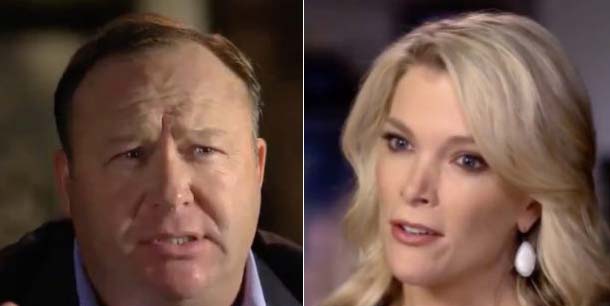
About a month ago, I received an email from a reader that began like this: "I love your work . . . but please stop citing Infowars! I thought you were hacked for a second."
The reader's message referred to a story I had written about Fox News host Kimberly Guilfoyle gunning for Sean Spicer's job. Guilfoyle had confirmed her interest in becoming White House press secretary in an interview with the Bay Area News Group, following a New York Times report that President Donald Trump "has raised the Fox News host . . . to allies as a possible press secretary."
The Times was not the first to report Guilfoyle's candidacy, however. That distinction belonged to Infowars, the website run by conspiracy theorist Alex Jones, which based its report on unnamed "White House sources."
Much of what Jones peddles is total garbage. He is perhaps the nation's foremost 9/11 "truther," insisting that the World Trade Center attack was an "inside job." He says the government controls the weather and uses it as a weapon, and claims juice boxes are lined with estrogen as part of a secret plot to turn boys gay.
But the reality - lamentable as it might be - is that Megyn Kelly, who interviewed Jones for this week's episode of her "Sunday Night" news magazine, and the rest of the media can't just ignore him.
Here's why:
Jones apparently does have a line to the White House that occasionally produces accurate information. Before the Guilfoyle scoop, Infowars obtained an outline of Trump's February address to a joint session of Congress, ahead of any reputable news outlet. (Count me among those who were skeptical of the outline's legitimacy until Spicer read it - practically verbatim - during a news briefing.)
Jones recently welcomed Mike Cernovich to the Infowars family. Cernovich is a conspiracy theorist in his own right, but he was first to report in April that it was Susan Rice, the Obama national security adviser, who unmasked the identities of Trump campaign associates in U.S. intelligence reports last year.
Jones also seems to wield a measure of influence over the president's thinking. Some of Trump's outlandish claims - about the media covering up terrorist attacks, about millions of undocumented immigrants voting for Hillary Clinton - can be traced to Infowars.
"Your reputation is amazing," Trump told Jones in December 2015, when the billionaire presidential candidate appeared on Jones's talk show.
Earlier this month, Trump's reelection campaign shared an Infowars article in an email blast.
A perpetual challenge in journalism is deciding whether to give fringe figures and ideas the attention they seek. There is no clearly defined point at which someone like Jones becomes so significant that he must be confronted, rather than ignored.
But it is increasingly difficult to argue that Jones, who commands the attention of the president, has not passed the mark.
"Our goal in sitting down with him," Kelly explained on Twitter Tuesday, "was to shine a light - as journalists are supposed to do - on this influential figure."


 Contact The Editor
Contact The Editor
 Articles By This Author
Articles By This Author